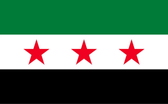
Call 0330 880 3600 Calls may be monitored or recorded. Opening Times.
- TRAVEL INSURANCE
- COVID-19 COVER
- More Options
- Help & Advice
- Existing Customers

Call 0330 880 3600 Calls may be monitored or recorded. Opening Times.

Need help?
UK Customer Services0330 880 3600*
Open Monday to Friday 9:00am to 6pm, Saturday 8:30am to 4pm and closed Sundays.
*Calls are recorded for training and quality purposes.

Official name: Syrian Arab Republic
Capital city: Damascus
Languages spoken: Arabic, Kurdish, Armenian
Population: Around 22 million (though many displaced by conflict)
Currency: Syrian pound (SYP)
Time zone: GMT+2
Driving side: Right
Climate: Mostly arid and semi-arid, with Mediterranean climate along the coast
Syria was once a centre of ancient civilisation and home to UNESCO World Heritage sites such as Palmyra, Aleppo, and the Umayyad Mosque in Damascus. Its history, culture, and landscapes are extraordinary. However, years of civil war have left much of the country devastated, with damaged infrastructure and widespread insecurity.
Travellers should be aware that Syria remains an extremely high-risk destination. Armed conflict, terrorism, kidnappings, and political instability make travel unsafe across much of the country. Foreigners are at particular risk, and consular assistance is extremely limited. Laws are strictly enforced, with alcohol and dress codes in conservative areas and same-sex relationships criminalised. Travel here is strongly discouraged.
Syria is located in the Middle East, bordered by Turkey to the north, Iraq to the east, Jordan to the south, Israel and Lebanon to the southwest, and the Mediterranean Sea to the west. The country’s terrain includes fertile plains, high mountains, and large deserts. The Euphrates River is the main water source, but drought and conflict have strained resources.
Damascus International Airport (DAM) is the main international gateway, though services are severely limited and often disrupted. Overland routes are extremely dangerous due to checkpoints, armed groups, and damaged infrastructure. While Syria’s ancient ruins and historic cities were once major draws, many are now inaccessible or badly damaged. The current security situation makes tourism largely unfeasible.
UK nationals require a visa to enter Syria, which must be obtained in advance. Entry is highly restricted and difficult to arrange. The British Embassy in Damascus is closed, and the UK government cannot provide consular support within Syria. Travellers should not rely on in-country assistance.
The Syrian pound (SYP) is the official currency. Economic collapse and sanctions have led to extreme inflation and shortages of goods. ATMs and banking services are unreliable, and international credit or debit cards do not work. Travellers would need to bring sufficient cash, but even then, exchanging money is complicated and risky.
Healthcare facilities in Syria have been severely damaged by years of conflict. Hospitals are understaffed and lack essential supplies. Medical evacuation would be necessary in most emergencies, so comprehensive travel insurance is vital but may not be valid under current travel restrictions. Outbreaks of diseases such as cholera and leishmaniasis have been reported. Clean drinking water is limited, and food shortages are common. Travel to Syria is extremely unsafe and should be avoided.